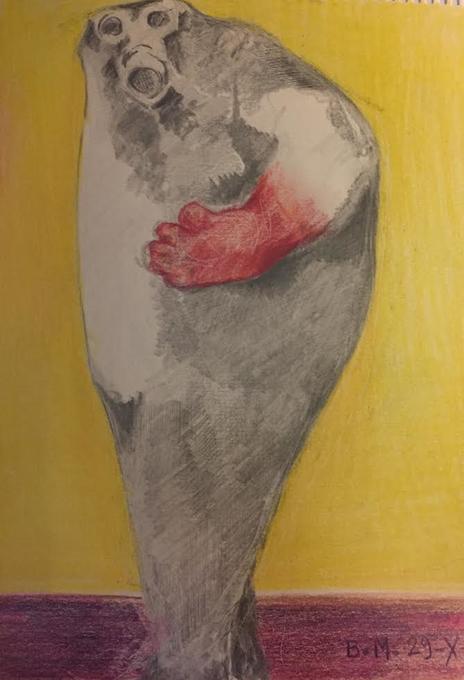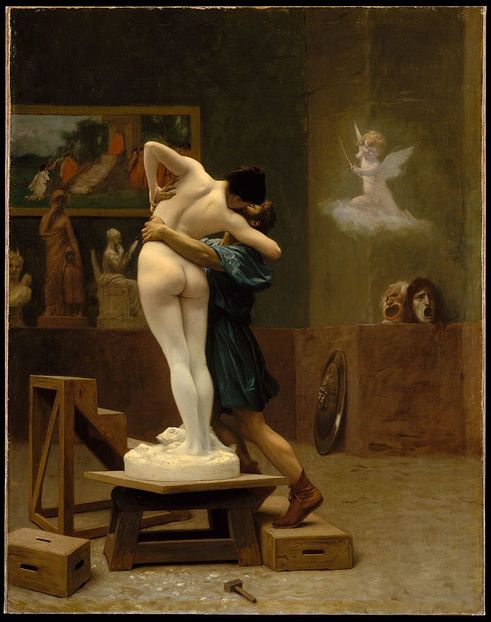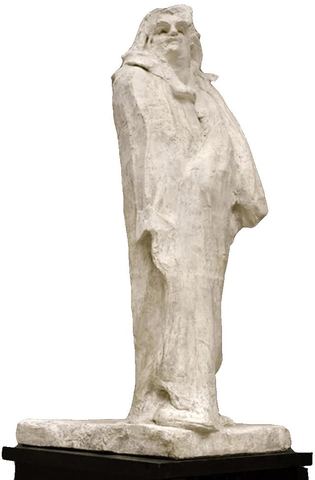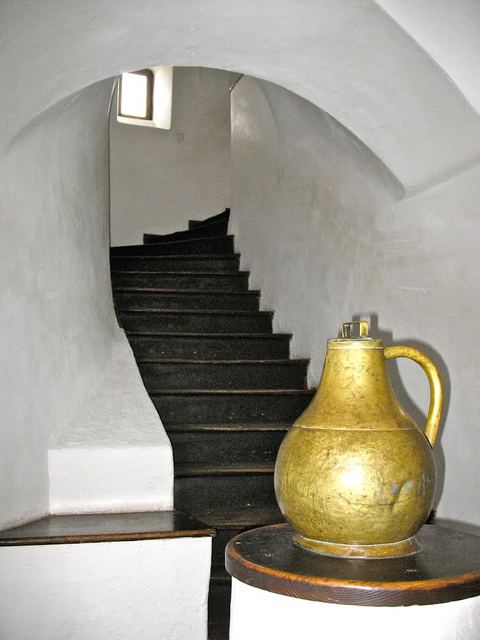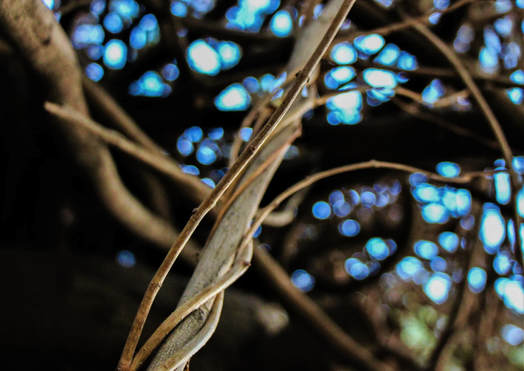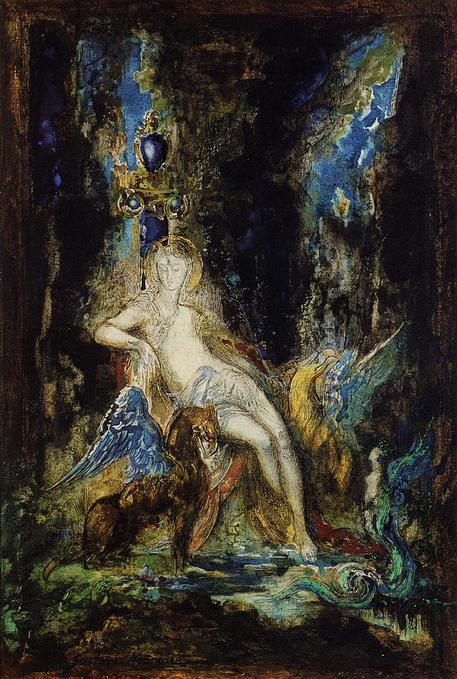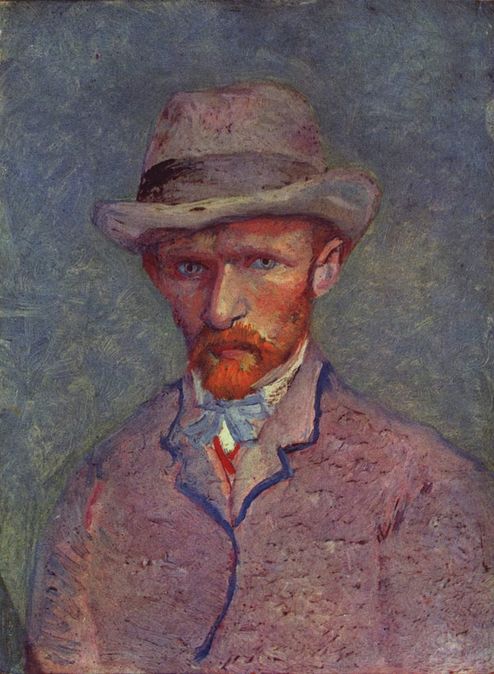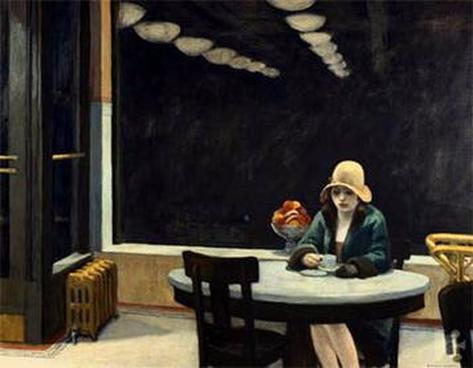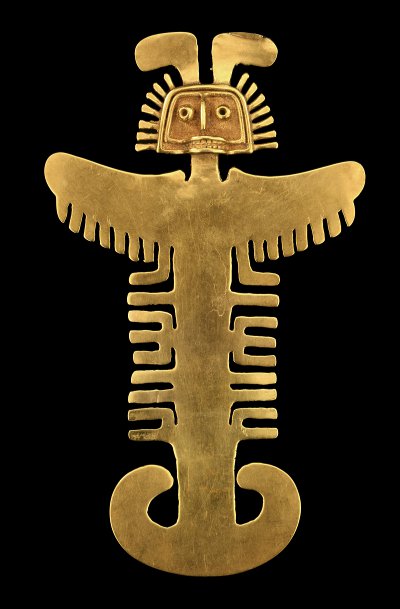|
Praise the Proletariat Praise the proletariat, and their nondescript looks. Faceless monkeys in bear-sized work clothes, gas mask and red working hands. Praise them as they perform before the organ grinder. Praise the proletariat, their love or their hate or their loyalty to a party, whatever that party may be. Praise their stagnant, slouch stance; broken but unbending, beneath the weight of the organ and its grinder. We sneer at them in work, cheer for them in war. No? Don’t look down. Look up and Praise the proletariat. Sing praise for them and dance. Let the music play. They are the monkey that keeps the organ grinding. So play on, organ grinder; play on and on and on. You, too, will be ground down. Dan Franch Originally from Chicago, Dan Franch currently resides in the country of Estonia. Currently a language teacher in Estonia, he has traveled extensively, has lived in six countries, and has had a wide variety of random life experiences. Restless by nature, Dan is doing his best to settle into an extended stay in his children's homeland. What Beast.. What beast is this with bloodied paw and face as if it never saw the mutilation it had wreaked on flesh from which such fluid leaked -- the adversary now deposed whose weaker means have been exposed as order in which nature chains its fleeting and enduring reigns... ...the lives that are by deaths sustained through instinct over time ingrained where conscience by design denied leaves nothing moral to abide... ...except in those who understand when needless blood is on their hand. Portly Bard Portly Bard: Old man. Ekphrastic fan. Prefers to craft with sole intent of verse becoming complement... ...and by such homage being lent... ideally also compliment. J’accuse Protect yourselves against the gas. It’s in every pore, hiding in the very fabric of the dying. See the spittle, the vomit, the blisters, the bulging eyes. It takes a few hours, so make sure. Your hands can finish the job, then stir the blood of the slaughtered. Sometimes you receive the still living in your country’s home with a smile, strangle them gently, dismember them quickly. Don the suit that protects you against the acid. You are not aware that we are watching. And waiting. Rose Mary Boehm A German-born UK national, Rose Mary Boehm lives and works in Lima, Peru. Author of two novels and three poetry collections, her work has been widely published in US poetry journals (online and print). Trapped Paw bloodied, eyes like pans, its mouth gapes as if to say, Look what you’ve done to me! Upon tangerine setting, hunched atop claret- drenched floor, an apelike shape resembles you, echoes me. When animals are ensnared, bound by ambush, they fade, wilt within teeth of contrivance, sever from the womb of truth. The raw wail of mistreatment, its stratagem, ugliness, need not be. Remembering the lens of compassion transmutes the wound, heals the horror, rinses each somber reflection, attends to the human condition with unsoiled, outstretched hands. Jeannie E. Roberts Jeannie E. Roberts lives in an inspiring setting near Chippewa Falls, Wisconsin, where she writes, draws and paints, and often photographs her natural surroundings. She has authored four poetry collections including the most recentThe Wingspan of Things (Dancing Girl Press, 2017). Her second children's book,Rhyme the Roost! A Collection of Poems and Paintings for Children, is forthcoming from Daffydowndilly Press, a project of Kelsay Books. She is Poetry Editor of the online literary magazine Halfway Down the Stairs. The Banality of Evil Triggered by the motion-detector, the light flicks on. He turns in surprise, a bloated corpse, a grub, a blunderer in a hazmat suit. He hasn’t had time to wash, gore-smirched to the elbows. What he thinks I cannot say, his face the dumb horror of his mask. Such a one would not give a satisfying moral inventory. I’d ask in vain. His burner phone rang, and he was sent, paid in BTC, anonymously. I am implicated by having seen, and if not, by knowing of him just the same. In fact, were I to undo the snaps and pull his hood, I’d bare my own face with its hangdog sheen. Devon Balwit Devon Balwit lives scarily close to the Cascadia Subduction Zone. The author of Risk Being / Complicated and A Brief Way to Occupy a Body(among others), her individual poems can be found or are forthcoming here as well as in journals such as The Cincinnati Review, apt, Grist, The Sugar House Review, The Carolina Quarterly, The Timberline Review, Fifth Wednesday, The Free State Review, Rattle, etc. For more, see her website at: https://pelapdx.wixsite.com/devonbalwitpoet Perspective on Mohassess Untitled Don’t go to sleep. Don’t give in to the great gray beast, the one who stares at you through lenses of latter day mania. Don’t, just don’t.... He seems to pass by, but in your dreams he stops, red-handed, carrying off your sanity against the back-drop of sun-washed walls of what-ifs and could-have-beens. Don’t.... The beast’s gait will trod through your brain like regrets gone mad, pausing long enough to make sure that you never ever forget. Linda Owen Linda W. Owen, a former educator, is an active member in the Mississippi Poetry Society, Poets Anonymous, and Pennin' and Grinnin'. Her poetry appears in a variety of publications, but she especially enjoys working with and encouraging other poets. Audiences find her poetry readings to be delightful and thought-provoking. Holy I won’t ask the question that begins with Father, the one that attaches itself to the word Mother, the concept of punishment and reward. That blood I must drink. That confession I must make. That position of bowing down. Time was I could sing those songs, could fall and be redeemed. Time was I could believe in a father, a son, a mother and a baby child. A recitation that absolved. A debt paid with shame and sorrow. I want to be the moon crossing over the sun. I want to be a cloak that covers the world with light. I want to open like a rose, rise like the chorus that follows the verse. I want to journey with the lost souls, drunk only with the scriptures of galaxies-- I want to become what is written on the stars. Kerfe Roig Kerfe Roig says, "You can see my art and poetry on my website http://kerferoig.com/, or on the blog I do with my friend Nina, https://methodtwomadness.wordpress.com/ ." Exposed What? The apricot wall goes up to hold him back. We dared to make him walk in his own blood after we stripped the mask from his face. “What are you? A baboon?” “A dirty bleeding baboon who knows which strings to pull, which pockets to line with gold, which votes to steal. This conversation is over.” And we would say to him, “It had never begun.” Julie Eger A three-time winner of the Wisconsin Regional Writer’s Jade Ring, Eger’s stories appear in Fictive Dream, Flash Fiction for Flash Memory, Runcible Spoon, Fifty Word Stories, Tuck, Scarlet Leaf Review and the Cadence Poetry Anthology. She is working on an apocalyptic novella under the name Copper Rose. Connect athttps://julieceger.wordpress.com/. Remorse He’d heard that no disaster in a nightmare could actually kill you. But how did anyone really know? And why couldn’t he remember that comforting fact till he exploded from sleep? Tonight his psyche worked overtime. Two mugs of warm milk couldn’t stop his shivers, erase the sight of the weird, amorphous creature that ran him down. He’d faced gorier, scarier assassins than this humanoid storm cloud. Normally, he’d wake up when a monster grabbed him. No such luck. The blob plunged its fist deep in his gut, pulled its hand out dripping with blood. He didn’t scream, faint, or wake, just stood gawking at his assailant. The blob clutched its side like it felt the pain – its mouth an O of horror. It reminded him of that time Dad took a belt to him for breaking the neighbor’s patio door. He’d never forget that what have I done? expression – how Dad looked more shattered than the glass. Alarie Tennille Alarie’s latest poetry book, Waking on the Moon, contains many poems first published by The Ekphrastic Review. Please visit her at alariepoet.com. Tebi As a young bear cub Tebi was taken from the wild by Russian hunters forced to live in a small cage granted food only when he learned the tricks he was expected to do. “Dance!” Tebi stood on his hind legs swaying back and forth to the delight of children and grown-ups. His entire life was spent with a heavy chain on his neck tied to a post. The only time he got off the post was to attend an event where he was expected to perform. When he was younger crowds would clap and cheer. But recently public scrutiny and animal activist groups condemned this form of entertainment. Less and less Tebi was removed from the chain fastened to the post and spent long days and nights just sitting watching life passing him by. Since he was no longer making money for his owner his daily feed was less and less. When things were at their worst, he was given to a rescue group who took Tebi to a sanctuary. For the first time in his life the heavy chain was removed from his neck. His head felt light. The cage where he was placed allowed him to discover things beyond the chain restrains. He searched the far corners on his own. At 21 years of age, he was still the small cub at heart. He’d never had this much freedom in his life. As the months went by, Tebi was put into a larger area with others of his kind. He had never interacted with any other bear before. There was much to learn from each other. He watched while the other bear foraged for their meals. No longer were meals provided as an offering in a dish. He learned about berries, bugs, roots, grass and drinking from the river running through the sanctuary. Soon he was able to feed himself. He friended a younger sow named Tasha. They became inseparable. Where Tasha was Tebi was only a short distance away. Many months, they had not seen a human and they grew more independent in the wild. A truck appeared early one morning. Tebi became apprehensive as his natural distrust of humans had returned. The human darted him and Tasha and put them into small cages. Upon waking Tebi cried for his loss of freedom but was comforted by the sound of Tasha nearby. Hours and hours over bumpy roads they traveled until the trucks stopped. Their cages were placed on the ground next to each other. The men stepped away and magically the bars opened on the cages. Tebi cautiously stepped out of the cage, calling Tasha. Tasha poked her head out and followed Tebi as they ran off into the woods. They kept running until they no longer smelled the men. There was a stream both drank the water and started to forage for food. Tebi came across a tree with buzzing bees. His nose told him there was honey in that tree, his favorite. He clawed at the rotted wood but couldn’t get to the hive. Sticking his big paw into the tree he was stung by many bees, but was rewarded with a huge comb. The dripping honey ran down his claws as Tebi triumphantly lapped at the golden sweetness. Freedom tasted so good. Dawn DeBraal Dawn DeBraal lives in rural Wisconsin with her husband, two rat terriers and a cat. She successfully raised two children (meaning they left home and now support themselves!) Early attempts at writing won $75.00 in a poetry contest from “Your Daily Poem.com” and a song accepted for the International Habitat for Humanity song book. Recently retired, she has tried to turn her passion of telling a good story into writing one. Sideshow Souvenir I let him into my tent with portable easel and paints after the sideshow closed. I didn't mind being nude. It made sense. An artist must document-- capture unusual forms. What I couldn’t understand-- the red glove and gas mask. Symbolism is lost on an ignoramus like me. That's what the boss always says. It felt important, being examined in this particular way. Transformed into something better— Art. Not a curio. In my line of work one wears a black unitard to a Gawk ‘n’ Gander. Patrons pay to see my freaky form. I give them my head atop a silhouette. A thin, fabric modesty remains. Painter Man took my bared vulnerability, expectations of deeper beauty layered on clean canvas, and posterized them on souvenir pulp intended for a bedroom, not a gallery, wall—doubling down on disfigurement and disgrace. How did humanity become synonymous with compassion? I’ve only been handled as commodity. Jordan Trethewey Jordan Trethewey is a writer and editor living in Fredericton, New Brunswick, Canada. His work has been featured in many online and print publications, and has been translated in Vietnamese and Farsi. To see more of his work go to: https://jordantretheweywriter.wordpress.com A Welcoming Hand When I woke, he was still there, still waiting for me-- my apparition, or reality? Off and on through the night, for many long years he’d visit in my fears. At least, I’m certain that I always sensed terror in his comings, a darkness of drummings, but though these nightly visits, sometimes multiple, persisted, he never insisted on doing me any harm, nor causing any me alarm, not at all-- as best I recall. Yet I dreaded each return as though I feared he brought as presents the beheading of peasants, of whom I was one, and yet not just one, but one and one only, so terribly lonely, though I never wished for the companionship of fantasmic creatures of demonic features, and so I would run, to escape from a vague sense of presaged doom, confined to my room and finding no way out, always attempting in vain to scream and shout-- but what about? Not knowing whence or why he came, his confused look always the same, and that red hand of blame, that red hand of shame, that red hand, which by any other name would always scare as completely, so silently, sweetly, and tear my soul asunder with flashes of lightning and sounds of thunder-- yet, I wonder, since never in my dreams did he reach out or approach or attempt to attack, but always came back, until now, here at last, in the flesh(?) he stands fast by my bed, quite alive-- so will I survive? Is this my last day, one which even his patience can no longer stay? Must I go away? For the first time he turns, and face to face I see he yearns to approach. I let him encroach. In his left hand a bowl, very full, like a rich liquor, deep and red-- is this what I dread?-- and as he mixes, his red hand of death becomes a dripping red hand of wine; a comforting sign, so I take my last drink without fear. In this peace, his rest is mine. Ken Gosse Ken Gosse writes poetry using simple language with traditional meter and rhyme, often filled with whimsy and humor. First published in The First Literary Review–East, November, 2016, his poems are also in The Offbeat, Pure Slush, Parody, The Ekphrastic Review, and other publications. Raised in the Chicago suburbs, he and his wife have lived in Arizona over twenty years, always with a herd of cats and dogs underfoot. Murder "I will not leave anything behind for the necrophiliacs. Because how does a painting make sense in a world where there are no fish in the sea nor animals in the forest?" Bahman Mohassess Murder needs a gas mask. Unless it's a pig snout. Poor pig. Murder has a tender red blood-foot. Or blood-hand, in case Murder is human, standing like that, caught by the painter's brush. Murder is a dear bear, raised on two legs, looks right at you, a nice round middle, well fed. Murder is a metaphor, not exactly attractive. Its artist hides his talent under the screen of the primitive. The artist will destroy so much of his work. And make light of destruction. Or out of destruction. Or onto destruction. As death nears, the artist is robust with humour. And with the monstrosity of things. When my hand is my foot, when my mask is my face, when my appeal is to horror, when my arm curves to a pause, when my assigned task is complete, then I will sit on the crayoned floor against the yellow wall in the room bare of all. What I have done, I have done. Note: Before the Iranian Revolution (1978-79) Bahman Mohassess was a widely honoured artist in his home country. After the Revolution, much of his work was destroyed by the state, and then more of it by himself. See acclaimed documentary "Fifi Howls from Happiness," by Mitra Farahani. Shirley Glubka Shirley Glubka is a retired psychotherapist, the author of four poetry collections, a mixed genre collection, and two novels. Her latest poetry collection is Through the Fracture in the I: Erasure Poetry; her most recent novel: The Bright Logic of Wilma Schuh. Shirley lives in Prospect, Maine with her spouse, Virginia Holmes. Website: http://shirleyglubka.weebly.com/ Online poetry at The Ekphrastic Review here; at 2River View here; at The Ghazal Page here; and at Unlost Journal here and here.
0 Comments
Galatea
It was his chisel that carved bone, his careful fingers molded flesh, although not meant as flesh then, only refuge. Tell me: what does it mean to be more than wanted so hands unfold from ivory creases and lips peel in the cold like snake-skin? I never asked for this brain, these joints between finger-bones spread open; I could've kept the whole damn body for myself. But when a man finds warmth or touch and terms it love... To Aphrodite: sister, goddess, servant of man and his desire. I must give thanks for your kindness, its excess, abundance dripping like candle-wax from the temple’s altar. I never prayed. What, and to whom, have you given? Each year a sacrifice and another bull goes up in smoke. Steffannie Alter Steffannie Alter lives in Houston, Texas where she is a Master of Arts in Teaching candidate at Rice University. She is the former poetry editor of R2: The Rice Review, and her work has previously been published in Sou'wester. Memo from Balzac
On a visit to the Clark Institute I encountered a sculpture, Study for a Monument to Balzac, by Auguste Rodin. It was a figure with arms folded, about three feet high, and roughly sculpted in an expressionist style; I had recently read Stefan Zweig’s biography of Balzac, and I was intrigued by the writer’s gregarious personality, and the eclectic way he led the artist’s life. I stared at the plaster sculpture, which stood on a pedestal, facing me at eye level. I felt that Rodin had captured some of Balzac’s essence; this statue seemed to have a presence beyond its size and exuded a sense of aliveness. The tranquility of the museum had put me in an inward mood and as I looked at the statue of Balzac, and it seemed he was looking back at me. His glance was amiable, and I wondered; if I could ask the great novelist one question - what would it be? I had been thinking about the artist’s life, with all of its complexities, like figuring out how to make a living and still keep creating your art. Intuitively a question arose, and on a lark, I looked into Balzac’s eyes and asked in a low voice, “What’s the most important advice you would have for an artist?” I didn’t really expect a reply. Yet in an instant, “Be Complete Within Your Self,” popped into my mind. The words were stated like a pronouncement, with a firm clarity that took me off guard; it was as if the statue had actually answered back! I copied down the phrase in my notebook like a dutiful stenographer of the collective unknown. Later, I reflected on my experience and I realized that my short Q & A with Balzac was a spontaneous instance of what Carl Jung calls active imagination. Active imagination usually entails having a conversation with your inner self, or the inner figures that reside in your psyche. Through this conversation with these inner figures you may garner insight and advice. Here, at the Clark Institute I had engaged in a short chat with a statue. Balzac’s pronouncement at the museum resonated strongly with me in the following days as I tried to discern its meaning. I made a watercolour mandala, and around the top rim of the circle I painted, “Be Complete Within Yourself,” in bold letters in order to remind myself, and to further etch the phrase into my memory. I’m looking at that mandala as I write this. And I recall Balzac standing there, expressively carved in plaster, advising me. In present times, we are at a moment when the media has become overwhelming, and it seems to constantly be crying out for our attention at every turn. It seems important for us artists to stay in contact with the deeper waters that flow through our being. The values and the sustenance we find there are then imbedded in our work, which we send out into the world like a prayer. Anthony Rubino Anthony Rubino is a writer, and a sculptor. His work has appeared in Heart and Humanity Magazine, The Offbeat, (the print journal of Michigan State University), The Moon Magazine, The Young Ravens Literary Review, riverbabble literary journal, and October Hill Magazine (Fall, 2017). His travel story, When Serendipity Touches a Journey was republished in The Little Rose Magazine (3/4). Anthony lives in New York City with his wife, and their trusty pooches. Staircase: Dracula's Castle This is a dream staircase, no sign of nightmare-- too well-lit, with curves too clean. And the satisfying sense of contrast, of order. And those simple strokes. And the gentle whites and grays. As if a painter's brush held by a lover would gently trace the whole brain's shape and call it good. Except for the cold-- Except for the terrifying gold-- Shirley Glubka Photographer's note: "…a favourite photo I took at Bran Castle in Romania, also known as Dracula's Castle, though he lived there only a couple of months." Shirley Glubka is a retired psychotherapist, the author of four poetry collections, a mixed genre collection, and two novels. Her latest poetry collection is Through the Fracture in the I: Erasure Poetry; her most recent novel: The Bright Logic of Wilma Schuh. Shirley lives in Prospect, Maine with her spouse, Virginia Holmes. Website: http://shirleyglubka.weebly.com/ Online poetry at The Ekphrastic Review here; at 2River View here; at The Ghazal Page here; and at Unlost Journal here and here. The Opposite of Antipodes I buy the poet’s book because he is dating one of my exes and hope he will take her out to the café with the proceeds, because I want her to get out more. Then the poets I know walk into the bar, and I pass it around. Word salad, says D__. Overworked, says B__, and beautiful in the way of the poets we imagine, she flicks her hair and smiles. We drink tequila and rewrite the entire book as its opposite, so where it says, “You have no faith in certainty,” we pen, I have no doubt about ambiguity. “A sound too deep for peacocks,” becomes baby blue for blind turkeys, figuring it all means pretty much the same, though we cannot pinpoint the antonym of antipodes or what happened to words to make them so pointless. We are sloppy by now and falling into each other in the booth, but know enough to back away from the place our words have led us. This is not unlike the opposite of the days I passed with her, as we stumbled toward hyperbole: that time we pulled over and screwed on the hood of my car on a Rockwall, Texas frontage road as three AM truckers screamed past us, and my MA exam loomed in Lubbock, a day and a few hours later; or how we'd find God in Chicago boredom, there, on the sidewalk and know what was meant by skyward vines and sunset crickets; or when she would cry because paint dries, tops sit unspun, and people she loves are no longer, and I would say things I hoped would help. But maybe her poet knows what I do not about words. They are useless glue and cannot fix two people when they are broken, and when they had the talk in which they examined each other’s exes, he only nodded in silence when she told him I was good until I wasn’t, or I was never good, or always good, but bricks are hard when they fall out of the sky for no reason. Or she laughed, shook her head, and told him I was the easy one. She’d read me like a book and known from the first page forward I didn’t make any sense, and shouldn’t have been written in the first place. Todd Heldt Editor's Note: The beautiful photograph by Moshe Sakal was chosen by The Ekphrastic Review to convey the sense of life's natural weaving of vines in love and in poetry that the poem evoked for us, taken from the line about "skyward vines." The poem itself was written in response to poetry, not to a particular painting or photograph. Todd Heldt is a librarian in Chicago. His first collection of poetry, Card Tricks for the Starving, was published by Ghost Road Press. Other things written under various pseudonyms have appeared in print, on the internet, and on movie screens. Since becoming a father his biographical statement has less time to be interesting. Triptych
Drawn lights. The blinds descending. No disguise hides anything. Soundscapes engage the room whose alternating patterns craft our frame: my supplications answered, in her name. Now, as laced shades are covered, light perfume eclipses what the daylight blossomed, ground and air, combined with water, to surround our limbs: fresh vines, new woven, an array of tips and trellises. We fabricate with each renewal, figures, recreate her breath under whose ministrations sway both reed and branch. All shadows disappear. Shift focus. Change the camera angle. Sheer textures grow insubstantial. What we hold is shared with yet another. Through the air descending now between us, as in prayer, the space around us fills, her hands enfold our motions. Now, as we become, so she renews herself. Our patterned ecstasy, unseen by any mirror, builds, cascades as if the wind, through sudden waterfalls dancing between the stream and rock, recalls our earliest constructions. Now what fades remains as afterimage in our eyes. W.F. Lantry W.F. Lantry’s poetry collections are The Terraced Mountain (Little Red Tree 2015), The Structure of Desire (Little Red Tree 2012), winner of a 2013 Nautilus Award in Poetry, The Language of Birds (2011). He received his PhD in Creative Writing from the University of Houston. Honors include the National Hackney Literary Award in Poetry, Patricia Goedicke Prize, Crucible Editors' Prize, Lindberg Foundation International Poetry for Peace Prize (Israel), the Paris Lake Poetry Prize and Potomac Review Prize. His work appears widely online and in print. He currently works in Washington, DC. and is editor of Peacock Journal. Van Gogh in Paris I hung paintings-- red gladioli, coppery fritillaries, the buttery yellows of daffodils-- from floor to ceiling in the Cafe du Tambourin as if it was the Salon. I was intoxicated: new styles of art were like hats in a millinery shop, everywhere. I tried them all on: Monet's, Seurat's, Gauguin's... the hats fitting easily on a dandy’s red head. But I was drinking day and night, my health failing, as was Theo’s. I had to leave Paris, where I had arrived “like a gust of music through an open window,” as Theo joked. Now my leaving surprised him. “Why give up friends for the south?” He shook his head, worried, knowing loneliness was more poisonous than absinthe. Bob Bradshaw Bob Bradshaw is recently retired, and living in California. He is a big fan of the Rolling Stones. Mick may not be gathering moss, but Bob is. Bob's work can be found in many publications on the net, including Apple Valley Review, Eclectica, Loch Raven Review, Peacock Journal and Pedestal Magazine, among others. A Pale Fired Dream is a Haibun in a Renga
after A Ghost Story, and Kobayashi Issa And yet, only an aquatic metaphor, where ars moriendi becomes James Blake’s James Blake and Gertrude Stein awaits bookcased, no, not to the glass of muddled mint and shandy-- a measured quatrain, the kuhi cloistered, un-carved; verses sealed, and sequestered; now the viewfinder only tapered. Sandwiched between the edges of the anti-oedipal and New Brutalism (no tall white fountain played), where will the eidolon go in this city of tears? In an artifice, the town crier picks up a drop of the same channel up to his jawline, his handbell unintentionally ringing in the same gait. There is no one pond. There is no one pond dithered. One thing-in-itself. Cyclorama to the end. Dithered. More than no one pond. Prosopopoeia is when a dew drop mattered, a poem-in-itself. A posthumous fragment, the senryu nowhere to be found-- “The world of dew is the world of dew. And yet, and yet—“ Iain Lim Jun Rui The haiku that helped inspire and ends this poem is "The World Of Dew" by Kobayashi Issa (Japan, 1763-1828). Iain Lim Jun Rui is a Singaporean poet and filmmaker currently reading Philosophy at KU Leuven. Also a member of Singapore-based literary collective /S@BER, he is a two-time winner of the Love Poetry Competition and a finalist in the National Poetry Competition 2017. His poetry has been commissioned by the Singapore Arts Museum and National Gallery Singapore and is published in Rambutan Literary, ASINGBOL, Twin Cities and Voice & Verse Magazine among others. While having produced and directed several short films, his first documentary short is a finalist at Singapore Heritage Short Film Competition 2017. Decision in an Automat
Is she brooding as she studies the coffee in her cup? Does its blackness reveal what she has hidden from herself? Has it a magic like tea leaves or a dark crystal ball that will tell her her future, even if dreary, even if doomed? We can only wonder why she lingers here, where table-tops are anaemic-white and chairs are hard and bare, where a vast pane of glass reflects garish lights off a background of night, and radiators don’t give a cough or half a wheeze for comfort or heat. Is it something that awaits her at home, if she has someplace she can call a home? But fur-lined coat and cloche hat insist she has money enough for that. But is that residence more empty than this automat, more lonely a place than this, and did she come here for company but found only coffee instead? Or is this what she wanted, solitude she craved, an escape from shouting accusations or from silent interrogations more probing than the silence of this automat? True, in the past, she sold herself cheaply for two-bit parts, but today she was made understudy to a Broadway star. Yet she knows she’ll be told it’s just second place in her life’s race, trapped and still circling in a cul-de-sac that will leave her drinking coffee in this automat. If you look closer, though, you will see there is hope. No longer does she contemplate the contents of her cup. Her gaze is raised above the brim and aimed at some skyline just dawning in her mind. The coffee has disclosed its truth, and she has decided what she will do. She will stride proudly out like Gloria Swanson, with chin asserted, nose upturned, determined she will be no second place. She will ride under the Hudson with a ticket one way on a train to sunshine and a new name, to photographs and talent scouts, agents and no casting couch for star-billing with Valentino on the silver screen. No need to be arraigned by an eastside lover. No need to escape to an automat. Hello, Hollywood, Rudolf and Charlie! Good riddance, kiss off, New York! Jack Grady Jack Grady is a founder member of the Irish-based Ox Mountain Poets. His poetry has appeared online or in print in many literary journals and anthologies, including such publications as Crannóg; Live Encounters; The Ekphrastic Review; The Galway Review; And Agamemnon Dead: An Anthology of Early Twenty-First Century Irish Poetry; North West Words; The Worcester Review; Poet Lore; A New Ulster; Mauvaise Graine; Algebra of Owls; The Irish Literary Times; Skylight 47; Dodging the Rain; Outburst Magazine; Poesia a Sul 1; 300K: Une anthologie de poésie sur l’espèce humaine; Mediterranean Poetry, and others. He read in Morocco at the 3rd annual Festival International Poésie Marrakech, as the poet invited by its committee to represent Ireland, and he was invited to represent Ireland at the 3rd annual Poesia a Sul, in Olhão, Portugal. His poetry collection, Resurrection, was published in Belfast, Northern Ireland, UK, by Lapwing Publications and launched in October 2017 and is available at Jack Grady – Lapwing Store. Ekphrastic Writing Challenge
Thank you to everyone who participated in our last writing challenge for Bahman Mohassess, which ends today. Accepted responses for the Mohassess challenge will be published on November 23, 2018. The prompt this time is Gold Breastplate, Colombia. Deadline is November 30, 2018. PLEASE NOTE: In order to better organize submissions, we have a new email for challenge submissions: ekphrasticchallenge@gmail.com Everyone can participate! Try something new if you've never written from visual art before and discover why there are so many of us devotees. Ekphrastic writing helps artists and lovers of art to look more carefully, from different angles or mindsets, at visual art. And it helps writers discover new ways of approaching their work, their experiences, and writing itself. The rules are simple. The Rules 1. Use this visual art prompt as a springboard for your writing. It can be a poem or short prose (fiction or nonfiction.) You can research the painting or artist and use your discoveries to fuel your writing, or you can let the image alone provoke your imagination. 2. Write as many poems and stories as you like. 3. Have fun. 4. Send only your best results to ekphrasticchallenge@gmail.com. 5. Include GOLD WRITING CHALLENGE in the subject line in all caps please. Please use this email only for challenge submissions. Continue to use the regular email for regular submissions and correspondence. 6. Include your name and a brief bio. If you do not include your bio, it will not be included with your work, if accepted. Even if you have already written for The Ekphrastic Review or submitted other works and your bio is "on file" you must include it in your challenge submission. Do not send it after acceptance or later; it will not be added to your poem. We are sorry about these technicalities, but have found that following up, requesting, adding, and changing later takes too much time and is very confusing. 7. Late submissions will be discarded. Sorry. 8. Deadline is November 30, 2018. 9. Please do not send revisions, corrections, or changes to your poetry or your biography after the fact. If it's not ready yet, hang on to it until it is. 10. Selected submissions will be published together, with the prompt, one week after the deadline. 11. Rinse and repeat with upcoming ekphrastic writing challenges! |
The Ekphrastic Review
COOKIES/PRIVACY
This site uses cookies to deliver your best navigation experience this time and next. Continuing here means you consent to cookies. Thank you. Join us on Facebook:
Tickled Pink Contest
April 2024
|
